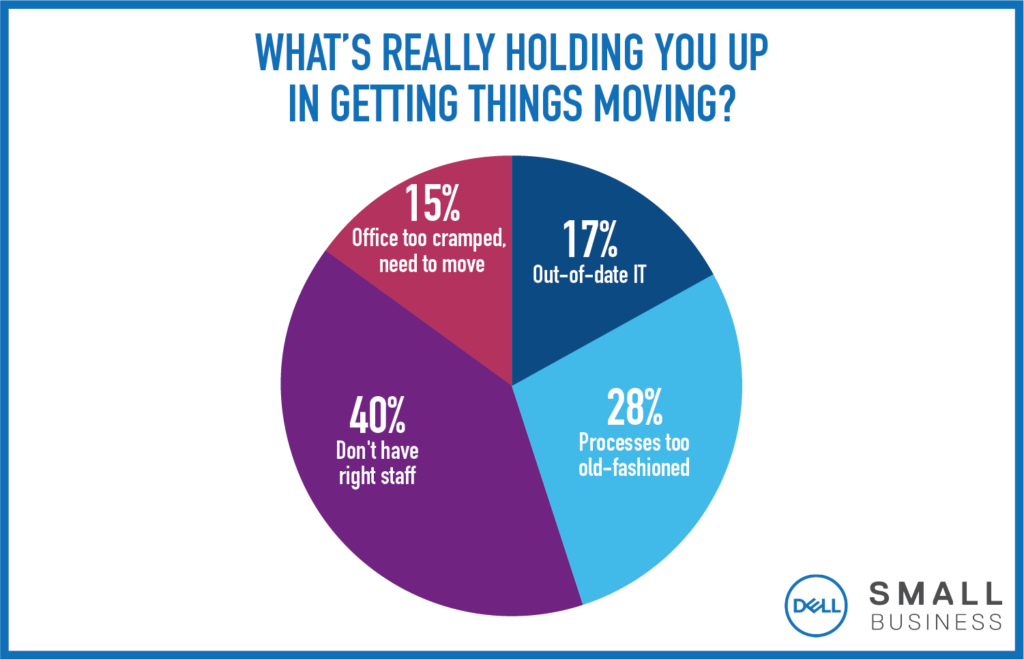Solving Britain’s productivity puzzle is vitally important if the UK is to compete against other, stronger economies, experts agree. Small business technology is key to unlocking this puzzle – especially as we move towards a screen-based attention economy.
Productivity in Britain has been flat over last 10 years, partly because of low wages, which has weakened the business case for technology investment.
Figures released in May 2019 by the Office for National Statistics revealed that British productivity has improved by just 0.5pc per year since 2008 and lags 15pc behind other G7 countries.
According to a Small Business survey sponsored by Dell Small Business, nearly two thirds of small business owners are losing sleep over their company’s lack of productivity.
Lesley Giles, director of thinktank The Work Foundation, says: “Part of the UK productivity problem is that our employment levels are high, and they’re divided between high-value roles but also low-value jobs.”
However, given the talk about extending the living wage, and if Brexit turns off the supply of low-cost labour, The Work Foundation argues that the business case for automation and digitalisation becomes more compelling.
In any case, argues Richard Blakesley, co-founder of tech fund Capital Pilot, trying to compete against other manufacturing countries is a race the UK can never win.
Blakesley says: “When we look at our productivity statistics – the amount of things we can produce compared to the number of people we have in manufacture- it’s always to look awful, and, frankly, it’s only ever going to get worse on the basis that the rate at which we can improve our efficiency at producing widgets is unlikely to match the rate at which other prime manufacturing countries can improve their efficiency.”
Technology innovation
When business experts talk about boosting productivity what they often mean is technological innovation.
A Yorkshire Bank survey has found that high-growth businesses are more likely to be tech-driven, with 71pc finding technology to be a key driver for growth.
Blakesley says: “Improving productivity has nothing to do with how good we are from old economy stuff, which is in decline. It’s about how we can create more value in the economy by doing new things. Productivity is about efficiency and our ability to produce value and generate growth, which is function of technological innovation – much more so than manufacturing efficiency.”
This need for technological innovation can only increase as Britain increasingly becomes an “attention economy” – businesses make money by holding your attention online with either a product or service or information/entertainment.
Blakesley says: “The attention economy is a subset of the wider technological piece. If attention is a scarce resource, certainly as far as marketing and selling to consumers is concerned, you need to market in a more efficient manner, and that’s obviously about software.”
Productivity driver
It’s not as if employees of small businesses haven’t got the message or are averse to working with new technology.
- Seventy per cent of UK employees agree that there’s a direct link between technology provided to them at work and their level of output, with new technology being the biggest single driver of boosting productivity going forward.
- More than half (53pc) think new technology will be a key driver of improved productivity in the future.
- One third of small businesses think that artificial intelligence will become a boon to their business yet only 2pc of Federation of Small Businesses members have adopted AI.
- Nearly half (46pc) of 5,000 employees surveyed across 12 countries for the Dell and Intel Global Evolving Workforce Study said technology has increased their productivity and enabled them to communicate faster.
Indeed, the Dell and Intel study found that one out of four employees globally say they would consider taking a new position if provided better technology that helps them be more productive.
Last year’s Work Foundation report on productivity agreed that up-to-date, fast and performing IT is required to make the difference between enhanced productivity and inefficiency.
One respondent cited: “My technology at work is always slow, not up-to-date, unreliable, it’s rubbish – I lose a day because my laptop is so old.
The Work Foundation’s findings are backed up by the Small Business Dell Small Business survey, which found that 17pc of small businesses blame out-of-date IT for hampering growth.
Megan Wright, small business technology advisor, Dell, says: “Productivity is key to the livelihood of your business, if you have anything that is going to give that hiccup in your business like a system being down, or software that might not be compatible with the trends of technology, that’s going to cause your business to take a pause.”
Technology resistance
Often it is not staff of small businesses who are resistant to new technology but owners of businesses themselves.
Lesley Giles, director of The Work Foundation, says: “We found that the UK is below average in adoption and effective use of technology in different processes, whether that’s understanding customers to people management through to marketing, we’re behind other European countries. We’re not near the leaders on any adoption of technology for business processes. And for the small business piece, the levels of adoption are even lower.”
Nearly one third of FSB members – who on average employ just seven staff – have yet to take advantage of any digital technology aids such as cloud accounting, e-commerce and CRM packages.
Giles says: “There’s wide variation in adoption and use of technology and often that is around tried-and-tested technology as well; it’s not about using technology in an advanced way. It’s things like cloud computing, shared platforms for collaborative working, CRM … basically being able to make use of data that digital provides to intelligently understand your business.
Dana Elman Vishkin, senior policy advisor at the FSB, says: “We want SMEs to be more aware of what cloud could mean for them.”
Often, it’s the managing directors or CEOs of small firms who are the ones lacking the confidence to employ new technology.
Says Elman Vishkin: “Business owners need to update their own skills; if they do send trainees to get training, they don’t send themselves. We found some lack of confidence in digital skills among business owners. There’s scope for improvement in how SMEs adopt digital technology.
“Almost one third found digital technology too challenging for them to make a decision about whether to invest in it or not. You could argue that a small business needs to innovate to survive. But significant innovation requires time from CEOs.”
Giles agrees that, while technology is only one piece of the productivity puzzle, developments such as cheaper IT hardware and software-as-a-service (SaaS) have made staying up to date more affordable.
“These things are definitely getting more efficient, effective and more cost-effective,” she says.
The message is clear: as UK increasingly pivots around a screen-based economy – whether you’re selling physical goods online or selling digital subscriptions to services – your IT must be up to date if you want to compete.
Dell Small Business is focused on boosting businesses productivity. Dell Small Business advisors help SMEs keep their technology be up to date, so their employees can be more productive.
For more tips on boosting your business productivity speak to a Dell Small Business Advisor anytime at: Dell.co.uk/smallbusinessadvisor






